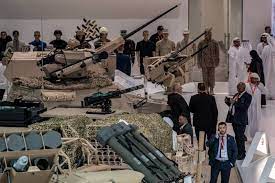ABU DHABI (AFP): Russia showed up in force Monday at an arms fair in the United Arab Emirates, displaying combat-tested weapons up for export, including rifles and air defence systems.
At an isolated pavilion at the International Defence Exhibition (IDEX) in Abu Dhabi, Moscow’s state arms exporter Rosoboronexport said it had more than 200 full-scale models of armament, ammunition and military gear.
Russian armoured vehicles, attack helicopters and anti-aircraft missile systems were also on display at IDEX, which opened Monday, as crippling Western sanctions push President Vladimir Putin to seek new markets for arms exports.
The UAE has maintained a neutral stance towards Russia’s war in Ukraine, which is nearing its one-year anniversary.
The oil-rich Gulf nation has also emerged as a top destination for rich Russian emigres fleeing the impact of Western sanctions.
Russia is one of 65 countries participating in the biennial arms fair in the UAE capital, which runs until the end of the week and is considered the region’s largest.
Russian deputy premier Denis Manturov, who is under sanctions, visited IDEX on Monday, according to Russian state news agency TASS.
“The UAE has retained its first place among the countries of the Arab world in terms of trade with the Russian Federation,” TASS quoted him as saying.
“In 2022, trade between Russia and the UAE increased by 68 percent and reached $9 billion,” he said.
‘Highly competitive’
Russia is the second largest arms exporter in the world after the United States, according to the Stockholm International Peace Research Institute.
In a statement ahead of IDEX, Rosoboronexport head Alexander Mikheev called Middle Eastern states “important partners” and said his firm was “working out proposals… that could be of immediate interest” to countries in the region.
He told TASS at IDEX on Monday Rosoboronexport was preparing to offer reconnaissance and strike drones to foreign partners.
Russia supplied twenty percent of the Middle East’s arms imports between 2000-2019, but the Arab Gulf’s arms market has been firmly dominated by American and European firms, said Albert Vidal, a Fulbright scholar at Georgetown University.
“While Russian firms may be trying to take advantage of the UAE’s search for a more diversified pool of suppliers, they will not have an easy time locking defence contracts with Abu Dhabi,” he told AFP.
“In addition to traditional Western suppliers, they now face highly competitive arms exporters like South Korea, Israel, and Turkey, all of which are already cooperating closely with the Emirati defence industry.”
Israel cooperation
Beyond Russia, Israel also made waves at the Naval Defence and Maritime Security Exhibition (NAVDEX) which opened alongside IDEX.
The UAE and Israel revealed off the coast of Abu Dhabi their first jointly created unmanned vessel.
The craft, which has advanced sensors and imaging systems and can be used for surveillance, reconnaissance and detecting mines, was created by Israel Aerospace Industries (IAI) and Emirati defence consortium EDGE.
Oren Guter, a former navy captain who leads IAI’s naval programme, said the joint project would counter “threats here in the area” but that the aim was also to deploy vessels abroad.
The UAE and Israel have steadily deepened their military partnership, including defence procurement, since they normalised relations in 2020 as part of the US-brokered Abraham Accords.
In January 2022, Israel’s defence electronics company Elbit Systems said its subsidiary in the UAE was awarded an approximately $53 million contract to supply systems to the UAE air force.
Emirati and Israeli defence firms are also working to develop an autonomous counter-drone system.
Countering maritime threats from Iran is “a natural area” of focus for the UAE-Israel partnership, said Torbjorn Soltvedt of the risk intelligence firm Verisk Maplecroft.
“Countering the growing threat to shipping in the Persian Gulf and Gulf of Oman will be a priority as both Israeli and Emirati ships have been targeted in Iran-backed drone and missile attacks,” Soltvedt told AFP.
On Sunday, Israel accused Iran of attacking an Israeli-linked tanker off the coast of Oman in a strike that caused minor damage. It was the second such accusation this year.







